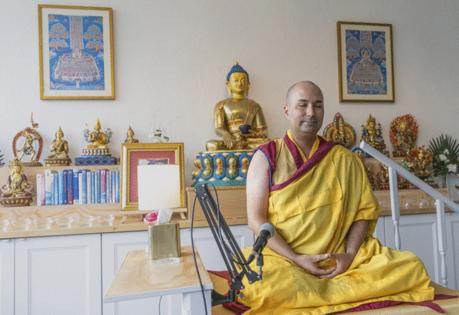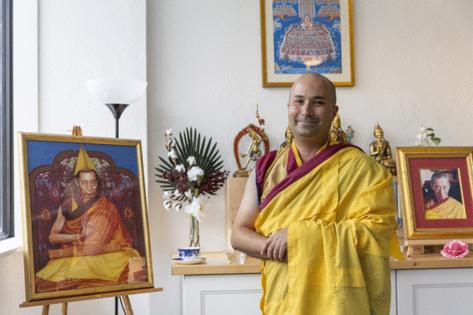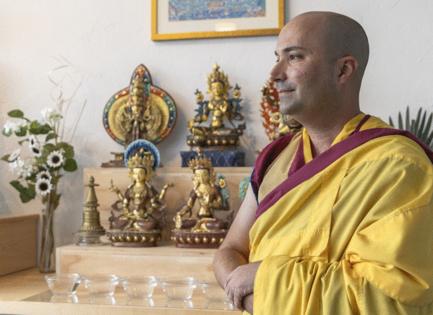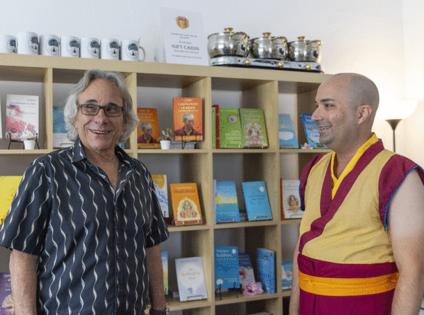With 'monk on Miracle Mile,' visitors seek peace in this hidden Buddhist center
Published in Religious News
MIAMI -- Most people who show up to meditation class over what used to be a popular Thai restaurant in Coral Gables are just looking to relieve some stress.
The spiritual part may come later, says Buddhist monk and resident teacher Gen Kelsang Tashi. Or it may not.
Either way, it’s all good here. After all, the mission of the Kadampa Meditation Center Miami — a modern Buddhist center housed above the shuttered Lotus Garden restaurant on Miracle Mile — is to help people develop inner peace and overcome unhappiness.
“At the very heart of everything that we’re doing is that wish to improve ourselves and benefit others,” said Tashi. ”To be able to do that, we need to develop our inner peace, we need to develop our wisdom, and we need to develop a good heart of kindness and compassion.”
The tiny second-floor center is easy to miss amid the hustle and bustle along Miracle Mile but the center has been there since 2020, opening just before the COVID-19 pandemic. Originally started in 2013 at a different location on Coral Way, it’s part of a Buddhist sect called the New Kadampa Tradition founded by a Tibetan monk named Venerable Geshe Kelsang Gyatso Rinpoche, who passed away in 2022. There are over 1,000 centers around the world and six other Kadampa centers in Florida, including a larger temple in Sarasota that can house monks and is used for retreats.
Tashi came to Buddhism more than 15 years ago, where he said he worked for a boutique consulting firm in communications field in New York City. He was struggling with managing stress himself. He had never tried mediation before, but after seeing a flier with an image of Buddha’s face on it at his local grocery store in Brooklyn, Tashi decided to give it a shot. The payoff, he said, was immediate. Now, after years of study, he’s an ordained monk.
“From that first meditation, I started to feel positive change in my state of mind,” Tashi told the Miami Herald during a recent vist to the center. “Some of that stress that I was just constantly feeling all the time started to reduce a little bit, and I started to get a feeling of calm and peacefulness that I hadn’t really had in a long time.”
New Kadampa, Tashi said, aims to make the teachings of Buddha and the practice of meditation more accessible to the world, particularly the West.
The center, which is entirely volunteer-run, has a dedicated membership of about 85, though more people drop in to take weekly classes or join workshops and retreats. The space itself is calming and approachable — even for people with no knowledge of Buddhism. According to Tashi that’s more or less the point of the New Kadampa Tradition.
Meaning of mindfulness
Despite the fact that there aren’t many Buddhists in Florida, the membership at the center has grown, slowly and steadily, over the past decade, said Michelle Grillone, the administrative director of Kadampa Meditation Center Miami. This growth reflects a larger trend in Florida and Miami, according to a religious landscape study from Pew Research, which found that the Buddhist population in Miami and Florida doubled in the decade between 2014 and 2004. Still, just 2 percent of people identified themselves as Buddhist.
Some people come to cope with emotional tragedies like heartbreak or the death of a loved one, but the majority find the center in an attempt to manage stresses of daily life.
“Step one is getting control over your mind, not letting your mind control you. That’s usually the hardest step for most people, because it’s almost like rewiring your brain,” said Grillone, who has been volunteering at the center for over 10 years.
She said Buddhist teachings are interwoven with the mediation classes — about 30 minutes per class — which can look like “tips and tricks on how to deal with that pain, suffering, attachment .. all these hot topics.”
People are left with a better understanding of their own minds, she said. “You start applying it and you start seeing how it works.”
Grillone’s own interest in meditation was prompted by the unexpected death of her mother when she was 33 years old. Meditation helped her deal with grief and anger, and made her “overall, a happier person,” she said.
Eventually after six months, she found herself wanting to learn more about Buddhism and began taking weekly in-depth study classes in addition to her one-hour meditation classes. Grillone said this is an option for those who want a deeper understanding of Buddhist philosophies, but that people can engage as much or as little as they want.
General meditation classes, for example, begin with the teacher and students singing the “liberating prayer” as a way to honor Buddha. Some people in the class sing while others just stand and listen.
“In no way is Buddhism, or Dharma, meant to judge or criticize. It’s whatever your path is ... whatever works for you, whatever you’re looking for, you can choose that,” she said, adding that many people who show up come from other religions — Catholicism or Judaism, for example.
A common misconception about Buddhism, according to Tashi, is that all traditions are the same. Though founded on the spiritual teachings of Buddha, like any other religion, the practices of Buddhism can vary throughout the world.
Grillone’s day job is working in finance management, something she describes as “high-stress.” But, she credits her meditation practice for helping her find peace throughout the day.
“That’s what I love about it, is that little to-go that you have inside of you, and whenever you need a just tap into it,” she said.
The mediation center — which is considered a religious non-profit organization — is very low profile. You won’t find its members on street corners preaching about the benefits of meditation. Members say it’s not in the Buddhist tradition to try and convince people to show up or promote the religion in any way.
But word has gotten around. One writer for Coral Gable Magazine did a piece two years ago where she talked about her experience meditating with the “monk on Miracle Mile,” and how she felt calmer after her first class.
While you can download a meditation app on your phone, said long-time member Todd Ellenberg, that doesn’t provide the same experience as coming to a center where there’s community, or what Buddhists call “Sangha.”
“I think what’s missing is Sangha,” he said. “Sangha is a very important source of support in order to exchange thoughts on our practice, to support each other in our practice, there’s strength when people come together with a shared intention.”
Ellenberg, who grew up Jewish, showed up to meditation classes with zero expectations years ago. Ultimately, he latched on to the philosophy of Buddhism and became a meditation teacher. He said the classes helped him develop a sense of empathy which caused him not to be so reactive to anger in his life.
“It isn’t like you are asked to embrace a dogma, a set of beliefs. It’s like, try it out if these practices work and you get some benefit out of it, wonderful. That’s great. If not, that’s okay too. Just let it go.”
____
Kadampa Meditation Center Miami offers meditation classes on Sundays at 11 a.m., at 7:30 p.m., Tuesdays in Spanish at 7:30 p.m. and Thursdays at 7:30 p.m. For the full schedule visit meditationinmiami.org.
____
This story was produced with financial support from Trish and Dan Bell and from donors comprising the South Florida Jewish and Muslim Communities, including Khalid and Diana Mirza, in partnership with Journalism Funding Partners. The Miami Herald maintains full editorial control of this work.
©2025 Miami Herald. Visit at miamiherald.com. Distributed by Tribune Content Agency, LLC.
















Comments